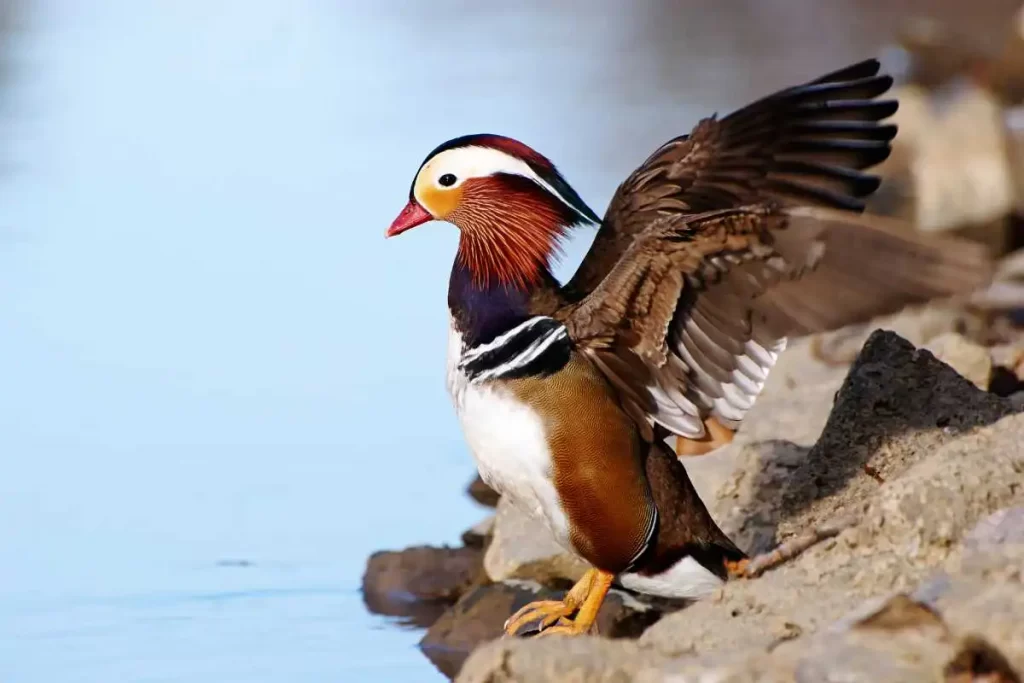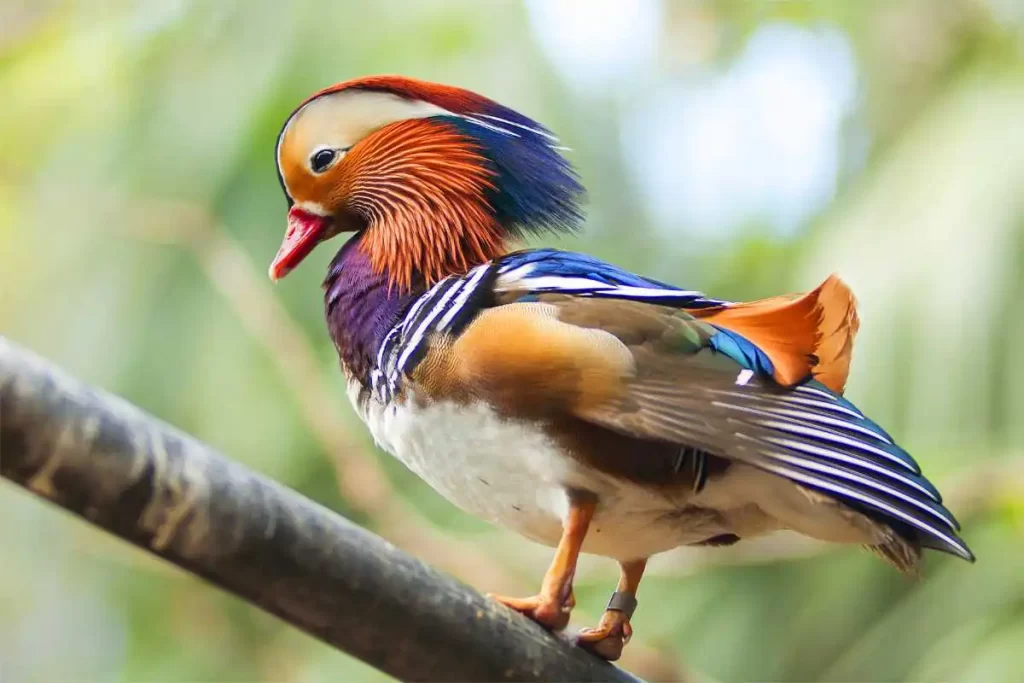Mandarin ducks are native to East Asia. They are known for their brightly colored feathers, with the males having distinctive orange and green markings on their heads and wings, and are often considered symbols of good luck and prosperity in Chinese culture.
Mandarin ducks are typically found in wooded areas near bodies of water such as lakes, streams, and marshes and are omnivorous, feeding on various plant and animal matter, including seeds, insects, and small fish.
Mandarin ducks have a long history in East Asian culture and have been revered for their beauty and symbolic significance for centuries. They are often depicted in art, literature, and folklore and have been kept as pets by royalty and the wealthy in many cultures.
Nowadays, Mandarin ducks have become popular with birdwatchers and are often kept in aviaries or as backyard pets. Despite their popularity, Mandarin ducks are a globally threatened species, with populations declining in some parts of their native range due to habitat loss, hunting, and other human activities.
Mandarin Duck Habitat
Mandarin ducks typically build their nests in tree cavities and lay clutches of up to a dozen eggs. They are omnivorous, feeding on various plant and animal matter, including seeds, insects, and small fish.
Some Mandarin ducks may migrate to warmer regions in the winter, while others may remain in their native habitats year-round.
Mandarin Duck Facts

- They are known for their brightly colored feathers, with the males having distinctive orange and green markings on their heads and wings.
- Mandarin ducks are also known for their distinctive calls, which are described as a series of high-pitched whistles.
- These ducks are typically found area water source such as lakes, streams, and marshes.
- Mandarin ducks are omnivorous, feeding on various plant and animal matter, including seeds, insects, and small fish.
- These ducks typically build their nests in tree cavities and lay clutches of up to a dozen eggs.
- Mandarin ducks are known for their elaborate courtship displays, which involve males performing elaborate movements and calls to attract a mate.
- Some Mandarin ducks may migrate to warmer regions in the winter, while others may remain in their native habitats year-round.
- Mandarin ducks are considered symbols of good luck and prosperity in Chinese culture.
- The population of Mandarin ducks is considered stable, although they are threatened by habitat loss and hunting.
Mandarin Duck Lifespan
Mandarin ducks are a long-lived species, with an average lifespan of 7-12 years in the wild. However, some individuals have been known to live for up to 15 years in captivity.
Factors affecting a Mandarin duck’s lifespan include genetics, diet, and habitat quality. In general, ducks that have access to good nutrition and live in areas with relatively low levels of pollution and disturbance tend to live longer than those that do not.
Mandarin ducks are also vulnerable to predation by various animals, including owls, hawks, and humans. However, they are generally able to defend themselves and their young through various behaviors, including rapid flight and using their sharp claws to deter predators.
Mandarin Duck Diet
Mandarin ducks are omnivorous, meaning they eat both plants and animals. Their diet varies depending on the season and food availability in their habitat. In the wild, Mandarin ducks feed on a variety of plant and animal matter, including seeds, fruits, insects, worms, and small fish.
They search for food on the ground and in the water and may also occasionally feed on human-provided food sources such as birdseed or kitchen scraps. In captivity, Mandarin ducks can be fed a commercial duck feed diet supplemented with vegetables and fruits.
It is necessary to provide them with a balanced and varied diet to ensure they receive all the nutrients they need to maintain good health.
Mandarin Duck Mating
Mandarin ducks are known for their elaborate courtship displays, which involve males performing elaborate movements and calls to attract a mate.
These displays typically involve the male spreading his wings and shaking his head and body while making a series of high-pitched whistles.
The female will usually respond by shaking her head and body, and the two may circle each other and touch beaks before mating.
After mating, the female Mandarin duck will typically lay a clutch of 4-12 eggs in a nest made of twigs and grass, which she will incubate for about 30 days.
The male will usually stay nearby to defend the nest from predators but will not participate in incubating the eggs. Once the eggs hatch, the female will care for the ducklings while the male defends the nest.
The ducklings can swim and feed themselves within a few days of hatching and will fledge (leave the nest) at about 45-50 days old. Mandarin ducks typically form monogamous pairs and mate for life, although if one partner dies, the other may find a new mate.
Mandarin Duck Eggs
Mandarin ducks typically lay a clutch of 4-12 eggs in a nest made of twigs and grass, which the female incubates for about 30 days. The eggs are typically oval and are a pale green or blue color.
They are slightly smaller than chicken eggs, with an average length of about 3 inches (7.5 cm) and a width of about 2 inches (5 cm).
After the eggs hatch, the female Mandarin duck will care for the ducklings while the male defends the nest from predators.
The ducklings can swim and feed themselves within a few days of hatching and will fledge (leave the nest) at about 45-50 days old. Mandarin ducks typically lay eggs once a year, although some individuals may lay a second clutch if the first one is unsuccessful.
Mandarin Duck Call
Mandarin ducks are known for their distinctive calls, which are described as a series of high-pitched whistles.
The male’s call is typically louder and more elaborate than the female’s and is used to attract a mate and defend territory.
Mandarin ducks also make a variety of other vocalizations, including clucking, chirping, and hissing, which they may use to communicate with other members of their flock or to warn of potential threats.
In addition to their vocalizations, Mandarin ducks also use various nonverbal communication methods, including body language and physical gestures. For example, they may spread their wings, shake their heads, or bob their bodies to communicate aggression or submission.
They may also touch beaks or engage in mutual preening to strengthen social bonds. Mandarin ducks are generally social birds and may be heard calling and vocalizing throughout the day, particularly during the breeding season.
Mandarin Duck Migration

Mandarin ducks are native to East Asia and are typically found in wooded areas near bodies of water such as lakes, streams, and marshes.
Some Mandarin ducks may migrate to warmer regions in the winter to escape cold temperatures and limited food availability. These migratory birds typically fly in small flocks and follow established routes to their wintering grounds.
Mandarin ducks that migrate may travel several hundred miles, depending on the location of their breeding and wintering habitats.
These birds are generally strong fliers and can navigate long distances using visual landmarks and the Earth’s magnetic field. Some Mandarin ducks that live in more temperate climates may not migrate at all, remaining in their native habitats year-round.
Mandarin Duck Conservation
Mandarin ducks are a globally threatened species, with populations declining in some parts of their native range due to habitat loss, hunting, and other human activities.
They are classified as a species of “Least Concern” on the International Union for Conservation of Nature’s (IUCN) Red List of Threatened Species. Still, their populations are believed to be declining in some areas.
There are several conservation efforts underway to protect Mandarin ducks and their habitats. These efforts include habitat restoration and protection, population monitoring, research on the impacts of human activities on these birds, and education and outreach programs to raise awareness about the importance of conserving these birds and their habitats.
In addition, some countries have laws to protect Mandarin ducks and their habitats, and hunting these birds is generally prohibited.

